Back to: Pre Vocational Studies JSS 1
Welcome to class!
In today’s class, we’re going to be talking about the types of farm animals. I trust you will enjoy the class!
Introduction
Farm animals are domesticated animals raised for various purposes, such as food, labor, and companionship. They play a crucial role in agriculture and provide essential resources to humans. Let’s explore some of the most common types of farm animals.
Types of Farm Animals
Ruminants Animals
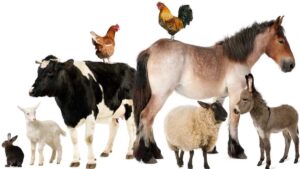
- Cattle: Cows are raised for their meat (beef), milk, and hides. They are also used for plowing fields and pulling carts. Cows are ruminants, meaning they have four stomachs and chew their cud. This allows them to digest tough grasses and other plant matter.
- Sheep: Sheep are raised for their meat (mutton), wool, and milk. They are also used for guarding flocks of other animals. Sheep are also ruminants and are well-suited for grazing on hilly terrain.
- Goats: Goats are raised for their meat (chevon), milk, and hides. They are known for their ability to graze on rough terrain and are often used for clearing brush. Goats are also ruminants, but they have a more agile and curious nature compared to cows and sheep.
Pigs
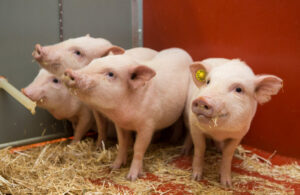
- Pigs: Pigs are raised for their meat (pork), lard, and bristles. They are also used as scavengers to clean up food scraps. Pigs are omnivores and can eat a wide variety of foods. They are intelligent animals and are known for their playful and social nature.
Poultry Animals
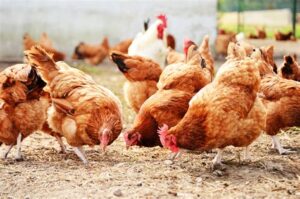
- Chickens: Chickens are raised for their meat (chicken), eggs, and feathers. They are also used for pest control. Chickens are omnivores and can eat a variety of grains, insects, and vegetables. They are social animals and live in flocks.
- Ducks: Ducks are raised for their meat, eggs, and feathers. They are also used for pest control and for hunting. Ducks are omnivores and can eat a variety of aquatic plants and insects. They are well-suited for living near water.
- Turkeys: Turkeys are raised primarily for their meat. They are also used for ceremonial purposes in some cultures. Turkeys are omnivores and can eat a variety of grains, fruits, and insects. They are social animals and live in flocks.
Equines
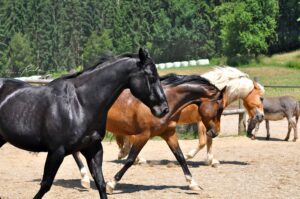
- Horses: Horses are used for transportation, work, and recreation. They are also used in equestrian sports. Horses are herbivores and eat grass and hay. They are intelligent animals and are known for their speed, strength, and beauty.
- Donkeys: Donkeys are used for transportation and work, especially in areas with rugged terrain. Donkeys are herbivores and eat grass and hay. They are known for their endurance and sure-footedness.
Other Farm Animals
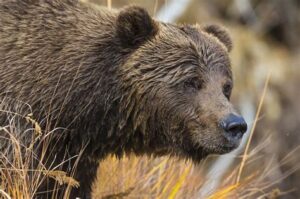
- Rabbits: Rabbits are raised for their meat, fur, and as pets. Rabbits are herbivores and eat a variety of grasses, vegetables, and fruits. They are known for their reproductive abilities and can produce multiple litters per year.
- Guinea Pigs: Guinea pigs are often kept as pets and are also used for scientific research. Guinea pigs are herbivores and eat a variety of grasses, vegetables, and fruits. They are social animals and live in groups.
- Fish: Fish farming (aquaculture) is a growing industry, with fish raised for food and ornamental purposes. Fish are carnivores or herbivores, depending on their species. They are raised in ponds, tanks, or cages and are fed a variety of commercial diets.
Uses of Farm Animals
- Food: Meat, eggs, milk, and other animal products are essential sources of nutrition for humans.
- Labor: Farm animals can be used to plow fields, pull carts, and transport goods.
- Companionship: Many farm animals, such as horses, dogs, and cats, are kept as pets for companionship.
- Economic Benefits: Farming provides jobs and income for millions of people around the world.
Challenges and Opportunities of Rearing farm animal
- Challenges: Farm animals can be affected by diseases, pests, and adverse weather conditions. Climate change also poses a significant threat to agriculture.
- Opportunities: Advances in technology and sustainable farming practices can help address these challenges and improve the efficiency and sustainability of animal agriculture.
Summary
Farm animals play a vital role in our lives, providing us with food, labor, and companionship. By understanding the different types of farm animals and their importance, we can appreciate the value they bring to our society.
We have come to the end of today’s class. I hope you enjoyed the class!
In the next class, we shall be discussing basic characteristics of farm animals.
In case you require further assistance or have any questions, feel free to ask in the comment section below, and trust us to respond as soon as possible. Great job and see you in the next class!
